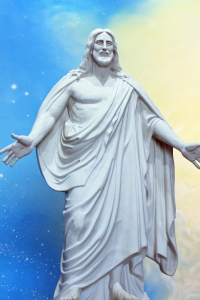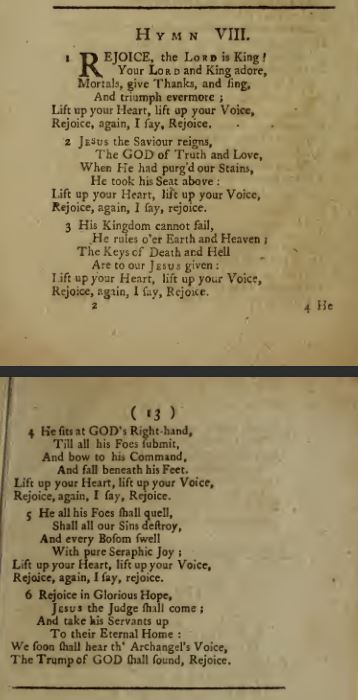 It seems at times that there are more problems in the world to cause sorrow than there are reasons to rejoice. For Christians, however, the hope that faith in Christ brings is like knowing that the beauty of spring flowers will come after a brown leafless winter.
It seems at times that there are more problems in the world to cause sorrow than there are reasons to rejoice. For Christians, however, the hope that faith in Christ brings is like knowing that the beauty of spring flowers will come after a brown leafless winter.
As we commemorate the resurrection of our Savior, Jesus Christ, at Easter every year, we remember the hope He provides of a glorious life beyond the grave. This is a reason to rejoice indeed!
In our hymn, "Rejoice, the Lord Is King!" the author, Charles Wesley, enumerates additional reasons we have to rejoice in the Lord. In the first verse, he reminds us that we can rejoice because Jesus is our King! For many today who live as free, independent people in a democratic republic, this may not seem to have much meaning. The author, however, lived as a British subject under the reign of Kings George II and George III. His lifetime spanned the years of the Scottish Jacobite rebellion and the American Revolutionary War. This understanding gives meaningful perspective about kings to the author's expressions in the text.
While many today may not currently live under a king's rule, most everyone on earth lives in a country under some type of government, and as we read in the Biblical Proverb, "When the righteous are in authority, the people rejoice: but when the wicked beareth rule, the people mourn." We can imagine then, what a wonderful society we would have with a perfectly righteous leader at the head of our government! While the prophesied coming of the Lord may not take place during our lifetime on earth, we can choose to be part of his kingdom in heaven. There, we can express adoration and gratitude to our Redeemer, and our songs of triumph and rejoicing can truly be "evermore."
In the second and third verses we are exhorted to rejoice that Jesus Christ is our Lord and Savior, a God of truth and love, who reigns, or possesses and exercises sovereign authority and power, and rules over both earth and heaven. To rule is to exert control over, and we rejoice that he had power and ability to rule over death. Through his suffering and atonement for our sins He rules over the punishment of hell also, thus holding "the keys of death and hell."
In the second verse, the last phrase is based on the Apostle Paul's teachings in the book of Hebrews. It reminds us of the eternal role of the Savior. "God, who at sundry times and in divers manners spake in time past unto the fathers by the prophets, Hath in these last days spoken unto unto us by his Son, whom he hath appointed heir of all things, by whom also he made the worlds; Who being the brightness of his glory, and the express image of his person, and upholding all things by the word of his power, when he had by himself purged our sins sat down on the right hand of the Majesty on high." (Hebrews 1:1-3) Although we may not always recognize His unseen hand in our lives, we can rejoice that because of his marvelous power," his kingdom cannot fail."
The text of the chorus is based on the Biblical instruction of the Apostle Paul to the Philippians that they should "Rejoice in the Lord alway: and again I say, Rejoice."
It is likely that the text was written within a few years of its appearance in "Hymns for Our Lord's Resurrection" published in 1746 at London, England. See an image of this book below as found at us.archive.org.

As seen in the image, the text appears to have originally been written with six verses. The last three are not as commonly used today as the first three. A few of the words in the second and third verses have been changed over the years. The original text reads as follows:
HYMN VIII
1 REJOICE, the Lord is King! Your Lord and King adore,
Mortals, give Thanks and sing, And triumph evermore;
Lift up your Heart, lift up your Voice, Rejoice, again, I say, Rejoice.
2 Jesus the Saviour reigns, The GOD of Truth and Love,
When He had purg'd our Stains, He took his Seat above:
Lift up your Heart, lift up your Voice, Rejoice, again, I say, Rejoice.
3 His Kingdom cannot fail, He rules o'er Earth and Heaven;
The Keys of Death and Hell Are to our Jesus given:
Lift up your Heart, lift up your Voice, Rejoice, again, I say, Rejoice.
4 He sits at GOD's Right-hand, Till all his Foes submit,
And bow to his Command, And fall beneath his Feet.
Lift up your Heart, lift up your Voice, Rejoice, again, I say, Rejoice.
5 He all his Foes shall quell, Shall all our Sins destroy,
And every Bosom Swell With pure Seraphic Joy;
Lift up your Heart, lift up your Voice, Rejoice, again, I say, Rejoice.
6 Rejoice in Glorious Hope, Jesus the Judge shall come;
And take his Servants up To their Eternal Home:
We soon shall hear th' Archangel's Voice, The Trump of GOD shall sound, Rejoice.
The hymn text of "Rejoice, the Lord Is King!" has been set to a number of different tunes over the centuries. The most popular according to hymnary.org is named DARWALL, written by John Darwall about 1770. Over a hundred years later, around 1894 Horatio Parker wrote a setting for the text, which he named JUBILATE, which is the Latin word for 'rejoice.' Both tunes have a sequentially upward movement that is very suited to the emphasis of the message. The text varies somewhat between the two, however, to fit the meter of the tune.
"Rejoice, the Lord Is King"appeared with the JUBILATE tune in the 1948 edition of "Hymns, The Church of Jesus Christ of Latter-day Saints" (LDS Hymnal). It continued in the same key, essentially unchanged, in the current 1985 LDS Hymnal.
A timeless, classic hymn of praise, it continues to remind us of the reasons we have to rejoice in this world.
 Horatio William Parker was born to Charles Edward and Isabella Graham Parker in September of 1863 at Auburndale, Massachusetts. Auburndale is a village in the town of Newton, Massachusetts, about ten miles west of Boston.
Horatio William Parker was born to Charles Edward and Isabella Graham Parker in September of 1863 at Auburndale, Massachusetts. Auburndale is a village in the town of Newton, Massachusetts, about ten miles west of Boston.
Horatio's father was a prominent architect in the Boston area, and it appears that Horatio was named after his uncle, who was said to be a lawyer in Boston. It can be presumed that the parents had means to provide well for their son's education and likely promoted his musical abilities. It is said that he was composing at the age of fifteen. At seventeen, he was reported to be serving as a church organist at Dedham, about nine miles southeast of Newton. Around the age of nineteen, he went abroad to study music at the conservatory in Munich. It seems likely that it was during these few years in Bavaria that he met his wife, Anna Ploessl, who was born in Munich, Bavaria.Returning to New York about 1886, Horatio taught music at the National Conservatory for about eight years.
A son, Charles E., was born to Horatio and Anna in 1891 while living in New York, but he died at the age of six months. It is believed that they also had two daughters who lived to adulthood.
In 1894 at the age of thirty-one, Horatio became a professor of music at Yale University in New Haven, Connecticut. It was also around this time that he wrote the hymn tune JUBILATE for the text of "Rejoice, the Lord Is King!" Ten years later, in 1904, he would become Dean of the school of Music at Yale.
In addition to his academic work, Horatio also served as a church organist and choirmaster at churches in Boston and New York. He was apparently active in promoting music in the community, and is said to have founded the New Haven Symphony Orchestra, and conducted the New Haven Choral Society for a time. Horatio composed music of various styles, but he was best known for his choral works, these included an oratorio and two operas.
His creative work was unfortunately cut short due to illness. He died of pneumonia in December of 1919 at the age of fifty-six. His remains were laid to rest near his parents' graves at the cemetery of St. Mary's Episcopal Church, Newton Lower Falls, Massachusetts; just a few miles from his birthplace.